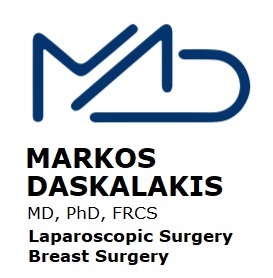Obesity has a negative effect on quality of life (QoL). Bariatric surgery results in significant weight loss with improvement of QoL. Very few studies have evaluated QoL after sleeve gastrectomy (SG), especially with a long-term follow-up.
Methods
Morbidly obese patients admitted for laparoscopic SG over a 30-month period were prospectively studied. QoL was assessed using the Greek version of the MAII questionnaire and a visual analog scale preoperatively and at 6, 12, 24, and 60 months postoperatively. Anthropometric data and obesity-related co-morbidities were recorded.
Results
A total of 95 patients with mean age of 37.4 ± 9.2 years and body mass index of 48.3 ± 7.1 kg/m2 completed the 5-year follow-up. Percentage excess body mass index loss was 51.7 ± 14.2, 64.8 ± 16.9, 67.4 ± 17.7, and 55.8 ± 25.5 at 6, 12, 24, and 60 months, respectively. All obesity-related co-morbidities improved significantly. MAII score increased from −.38 ± 1.3 preoperatively to 1.77 ± .8, 2.08 ± 0.8, 2.12 ± .7, and 1.67 ± 1.1 at the above time points, respectively (trend P < .001), and visual analog scale increased from 3.05 ± 1.6 to 9.11 ± 1.0, 9.2 ± 1.1, 9.03 ± 1.3, and 7.85 ± 2.4 (P < .001). Overall QoL scores at 6 and 24 months (P < .001), as well as patients' female sex, correlated significantly with higher QoL at the end of the study.
Conslusions
Laparoscopic SG is an effective bariatric operation, resulting in significant weight loss and improvements in QoL. Female sex and higher MAII score at 6 and 24 months predict better long-term QoL outcome.
Publication date: 2018/11/1 - Journal: Surgery for Obesity and Related Diseases - Publisher: Elsevier
Authors: Vasileios Charalampakis, Charalampos Seretis, Markos Daskalakis, Christos Fokoloros, Ahmed Karim, John Melissas



